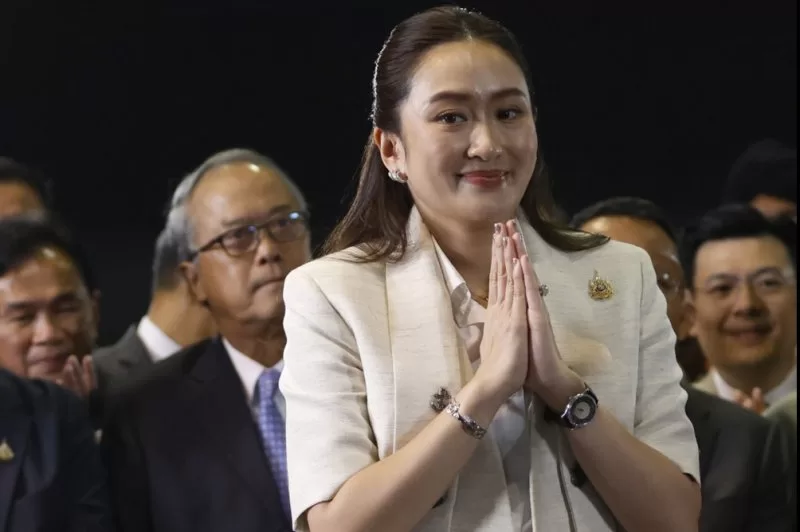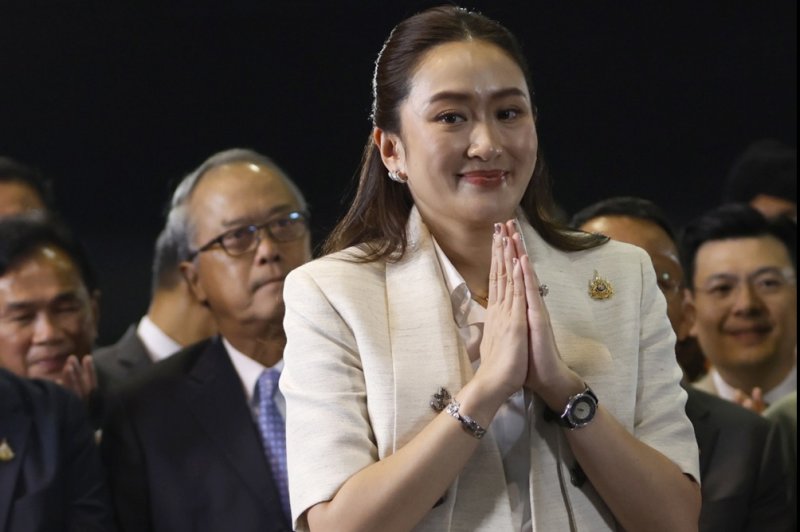Thailand’s newly elected Prime Minister Paetongtarn Shinawatra greets after winning the parliamentary vote to become a prime minister at the Pheu Thai Party’s headquarters in Bangkok, Thailand on Friday. Photo by Rungroj Yongrit/EPA-EFE
Aug. 16 (UPI) — Thailand’s parliament elected 37-year-old Paetongtarn Shinawatra, the leader of the ruling Pheu Thai Party and a member of the country’s most powerful and divisive political dynasty, as prime minister Friday.
Paetongtarn received 319 votes from 493 members of parliament to become the youngest-ever Thai leader — and the third from the Shinawatra clan, after her billionaire father Thaksin and aunt Yingluck.
Her election marks the latest twist in a long-running political drama marked by coups and court rulings. On Wednesday, former prime minister Srettha Thavisin — also a member of the Pheu Thai Party — was removed from office by the Constitutional Court on charges of appointing a cabinet minister with a criminal conviction.
The Pheu Thai Party is the most recent incarnation of the political dynasty founded by billionaire telecom tycoon Thaksin Shinawatra, who built up massive support by appealing to Thailand’s rural and working-class populations. Thaksin was prime minister before being ousted in a 2006 coup. His sister Yingluck was elected prime minister in 2011 and then also removed by the military in 2014.
Paetongtarn entered politics just two years ago after working in the family’s hotel business and was the front-runner candidate for the Pheu Thai Party during national elections last year.
She lost in a surprise upset to the upstart progressive party Move Forward and its reformist leader Pita Limjaroenrat, however.
The two parties initially formed a coalition to put forward a new government but Pita’s bid to become prime minister was derailed by military and pro-monarchy factions in parliament. Pheu Thai Party then joined forces with its longtime conservative foes to sideline Move Forward and seat Srettha as prime minister.
Earlier this month, Move Forward was dissolved by Thailand’s Constitutional Court over its proposals to reform the country’s draconian royal defamation laws, which the court said risked undermining the constitutional monarchy.
The court verdicts and behind-the-scenes maneuvering by traditional power players have further undermined Thailand’s fragile democracy, human rights advocates say.
“Paetongtarn Shinawatra’s rise to become Prime Minister should not obscure the judicial coup by Thailand’s Constitution Court that has devastated confidence in the country’s stability, and commitment to democracy,” Phil Robertson, deputy Asia director at Human Rights Watch, told UPI.
“For a country in the economic doldrums that is highly dependent on foreign investment and exports, this perfect political storm has rattled confidence in a way that few could imagine,” he said.
Looming over Paetongtarn’s victory is the presence of her father, Thaksin, who returned to Thailand from a 15-year self-imposed exile last year and remains a deeply divisive figure in the country.
His return was part of a bargain with his former political enemies to keep Move Forward out of power. In exchange, he saw an eight-year corruption sentence reduced and later commuted by Thai King Vajiralongkorn.
However, this week’s removal of Srettha was seen by many observers as a warning to Thaksin to rein in any future ambitions. He was also indicted on lese majeste charges in June over comments he made in a 2015 newspaper interview that allegedly insulted the monarchy.
Paetongtarn now inherits significant political challenges, including sparking an economy that has lagged behind its Southeast Asian neighbors. While on the campaign trail last year, she ran on populist proposals such as increasing the minimum wage, expanding health care coverage and reducing fares on public transportation. The Pheu Thai Party has pushed a digital wallet plan that would give a handout of roughly $275 to some 50 million Thai citizens, but the initiative has been delayed due to concerns from authorities including the central bank.
During her rise, the political novice quickly endeared herself to Pheu Thai voters but she has not yet won broader popular support. A poll released in June found that less than 5% of respondents favored Paetongtarn for prime minister, while Move Forward’s Pita received more than 45% of votes.

